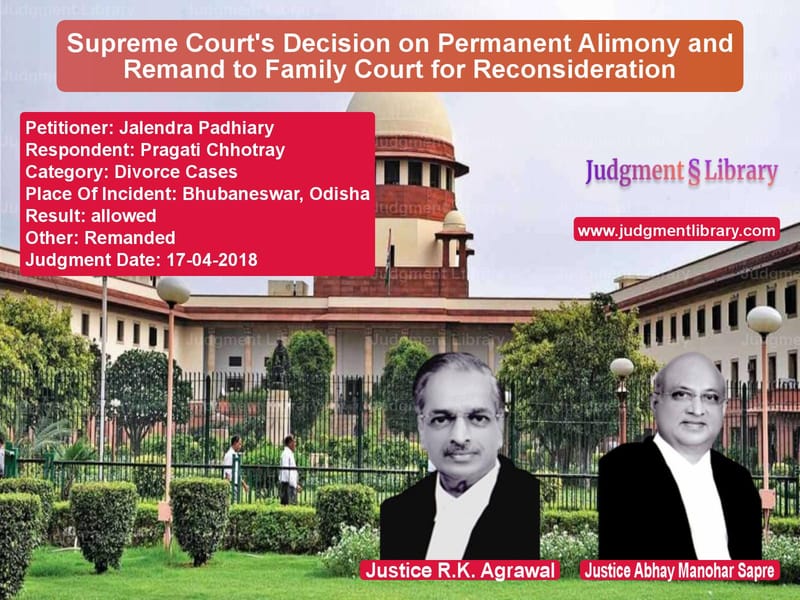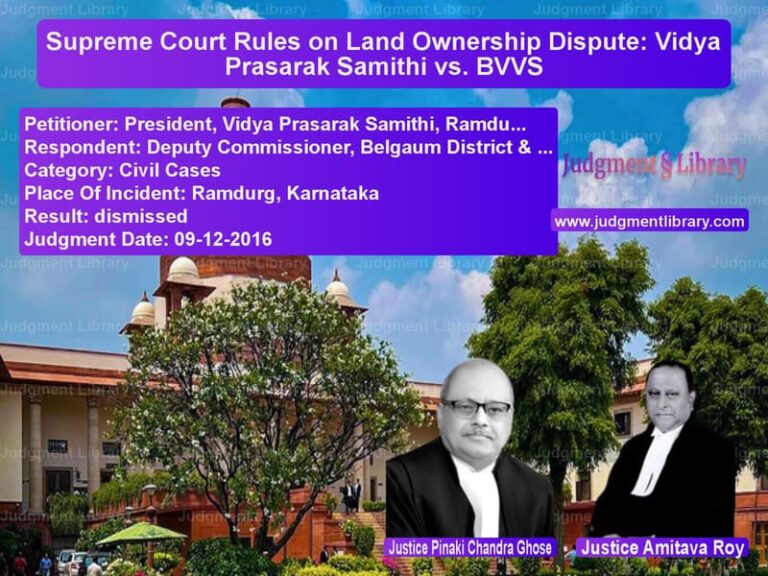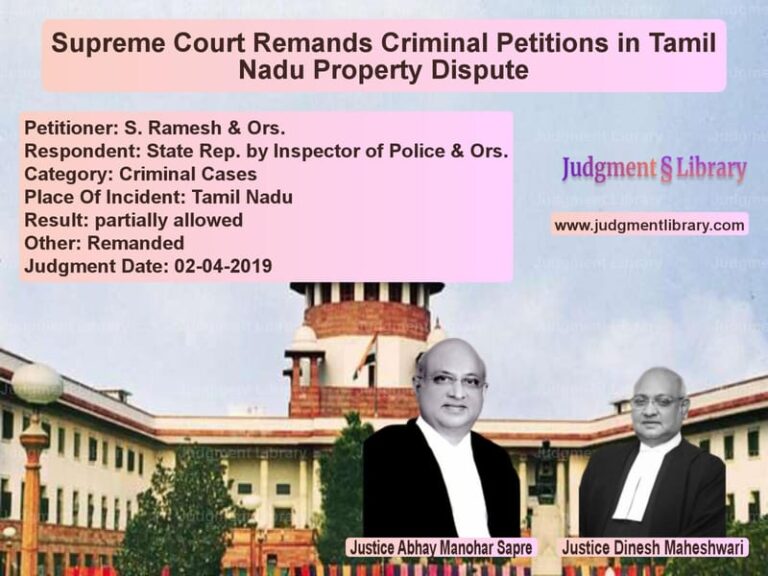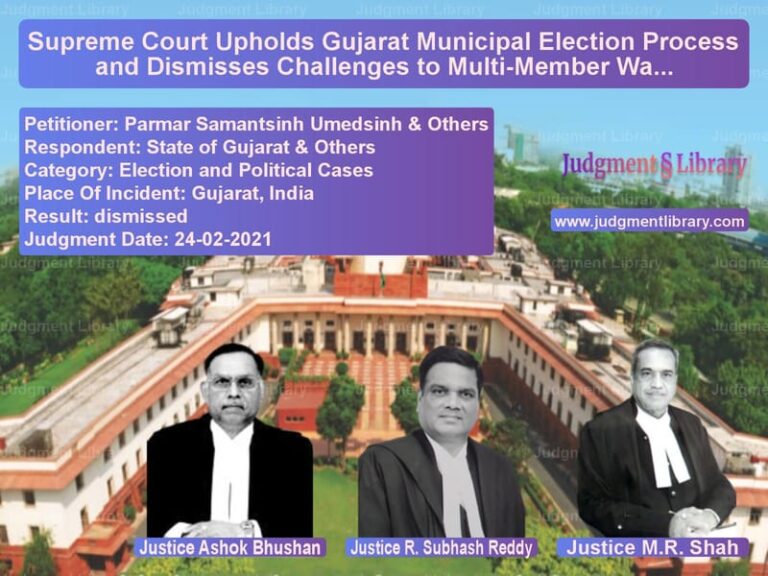Supreme Court’s Decision on Permanent Alimony and Remand to Family Court for Reconsideration
The case of Jalendra Padhiary v. Pragati Chhotray revolves around a divorce and alimony dispute between the appellant and the respondent. The issue at hand was the award of permanent alimony of Rs. 15,00,000/- granted by the Family Court, which was contested by the appellant, who felt the amount was disproportionate and unsupported by adequate reasoning. The case was brought before the Supreme Court after the High Court dismissed the appellant’s appeal in limine, effectively upholding the Family Court’s decision.
Background of the Case
The appellant, Jalendra Padhiary, and the respondent, Pragati Chhotray, had been married for several years before a petition for divorce was filed under Section 13 of the Hindu Marriage Act, 1955. The appellant sought a divorce on grounds of desertion and cruelty. The Family Court, after hearing the case, granted a decree of divorce and also awarded permanent alimony of Rs. 15,00,000/- along with litigation expenses of Rs. 10,000/-. The appellant contested the alimony amount, claiming that it was excessive, and filed an appeal in the High Court.
The High Court, however, dismissed the appeal without examining the merits of the case, thus upholding the Family Court’s decision. The appellant then filed an appeal before the Supreme Court, challenging the quantum of alimony and the lack of reasoning in both the Family Court’s and the High Court’s orders.
Arguments by the Appellant (Jalendra Padhiary)
The appellant argued that the alimony awarded was excessively high and not substantiated by a thorough analysis of the financial positions of both parties. The main points raised by the appellant’s counsel were as follows:
- The Family Court failed to provide a clear and detailed reasoning for fixing the amount of Rs. 15,00,000/- as permanent alimony.
- The appellant’s financial capacity to pay such a large sum was not adequately considered. The appellant argued that his income and assets were not sufficient to support such a high alimony amount.
- The High Court’s decision to dismiss the appeal without addressing these concerns was unjust and failed to consider the arguments raised by the appellant.
Arguments by the Respondent (Pragati Chhotray)
The respondent, Pragati Chhotray, defended the Family Court’s decision and contended that:
- The amount awarded as permanent alimony was in line with the standards set by similar cases and reflected the need for financial security after the dissolution of the marriage.
- The respondent’s financial situation, along with the marital difficulties faced, justified the amount granted by the Family Court.
- The appeal before the High Court was rightly dismissed as there was no merit in reducing the alimony amount or overturning the Family Court’s decision.
Supreme Court’s Judgment
The Supreme Court, in its judgment, acknowledged the importance of providing fair compensation through alimony, but also emphasized that the amount should be justifiable based on both parties’ financial conditions. The key points of the judgment included:
1. The Need for Reasoned Orders
The Supreme Court highlighted that both the Family Court and the High Court had failed to provide a reasoned judgment. It stated:
“It is essential that in all cases, the courts provide a reasoned judgment, which must include a detailed narrative of the facts, the issues raised by the parties, and the legal principles applied. In this case, the Family Court failed to discuss the financial condition of both parties, which is crucial in determining the quantum of alimony.”
2. Inadequate Consideration of Financial Capacities
The Supreme Court found that neither the Family Court nor the High Court had properly analyzed the appellant’s ability to pay the alimony. The judgment noted:
“Alimony should be fixed based on the financial capacity of the husband to pay and the wife’s needs. In this case, the courts did not sufficiently evaluate the financial positions of both parties before awarding such a large sum.”
3. The Need for Remand
The Supreme Court stated that the case needed to be reconsidered by the Family Court, as the matter had not been properly adjudicated. The Court ruled:
“We find it necessary to remand the case to the Family Court for fresh consideration of the permanent alimony. The Family Court should take into account the financial condition of both parties, including income, assets, and other relevant factors, before fixing the alimony amount.”
4. Instructions for the Family Court
The Supreme Court directed the Family Court to decide the matter afresh within six months, keeping in mind the observations made in its judgment. The Court stated:
“We remand the case to the Family Court with the direction to reconsider the permanent alimony in light of our observations. The Family Court shall decide the matter within six months and in accordance with the law.”
5. Continuing Maintenance Payments
Until the Family Court’s decision, the appellant was directed to continue paying the monthly maintenance amount that had been previously set by the Family Court. The Supreme Court observed:
“Until the final determination of permanent alimony, the appellant shall continue to pay the monthly maintenance as previously ordered by the Family Court, subject to any future adjustments.”
Final Ruling
The Supreme Court allowed the appeal, set aside the orders of the Family Court and the High Court with respect to the quantum of permanent alimony, and remanded the case to the Family Court for reconsideration. The Court ordered that:
- The permanent alimony amount of Rs. 15,00,000/- be reconsidered by the Family Court, taking into account both parties’ financial conditions.
- The Family Court should decide the case afresh within six months.
- The appellant should continue paying monthly maintenance until the final determination of alimony.
Key Takeaways from the Judgment
- The need for reasoned orders in all judicial matters, particularly in family disputes involving financial matters like alimony.
- The quantum of alimony must be based on the financial capacities of both parties, not on arbitrary figures.
- Courts are obligated to conduct a thorough analysis of both the husband’s and wife’s financial situations before awarding permanent alimony.
- In the absence of detailed reasoning, the case can be remanded for fresh consideration by the lower courts.
Conclusion
The Supreme Court’s ruling highlights the importance of judicial fairness and thorough reasoning in family law matters, particularly in cases involving maintenance and alimony. The judgment ensures that financial conditions are properly evaluated and that the final decision is based on clear legal principles. This case serves as an important precedent for future decisions regarding alimony and divorce settlements in India.
Petitioner Name: Jalendra Padhiary.Respondent Name: Pragati Chhotray.Judgment By: Justice R.K. Agrawal, Justice Abhay Manohar Sapre.Place Of Incident: Bhubaneswar, Odisha.Judgment Date: 17-04-2018.
Don’t miss out on the full details! Download the complete judgment in PDF format below and gain valuable insights instantly!
Download Judgment: Jalendra Padhiary vs Pragati Chhotray Supreme Court of India Judgment Dated 17-04-2018.pdf
Direct Downlaod Judgment: Direct downlaod this Judgment
See all petitions in Alimony and Maintenance
See all petitions in Property Division in Divorce Cases
See all petitions in Divorce by Desertion
See all petitions in Judgment by R K Agrawal
See all petitions in Judgment by Abhay Manohar Sapre
See all petitions in allowed
See all petitions in Remanded
See all petitions in supreme court of India judgments April 2018
See all petitions in 2018 judgments
See all posts in Divorce Cases Category
See all allowed petitions in Divorce Cases Category
See all Dismissed petitions in Divorce Cases Category
See all partially allowed petitions in Divorce Cases Category







